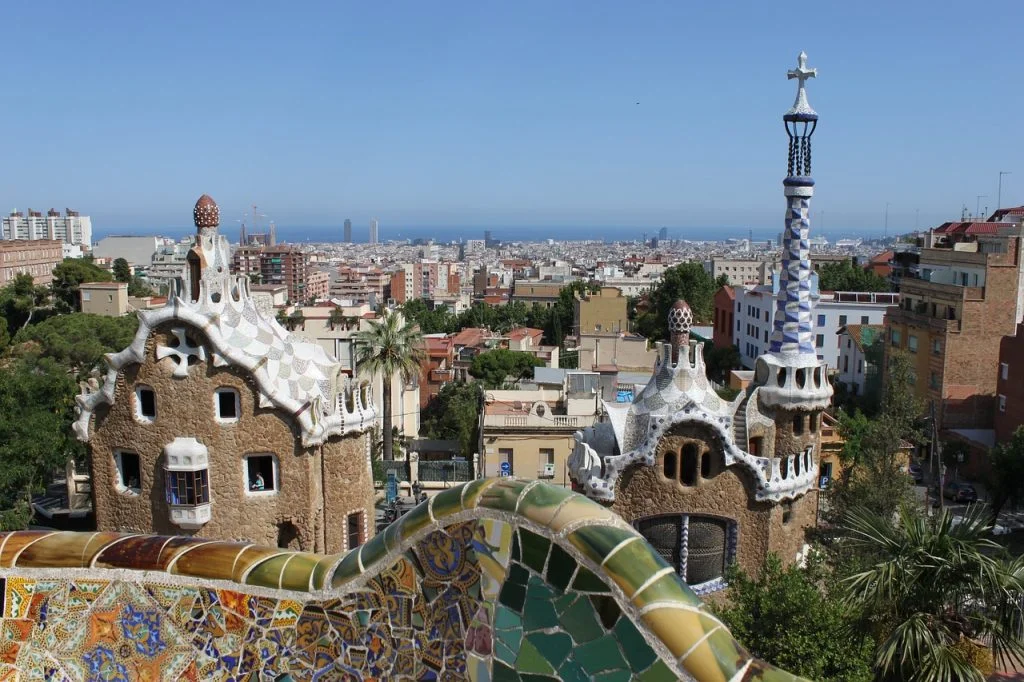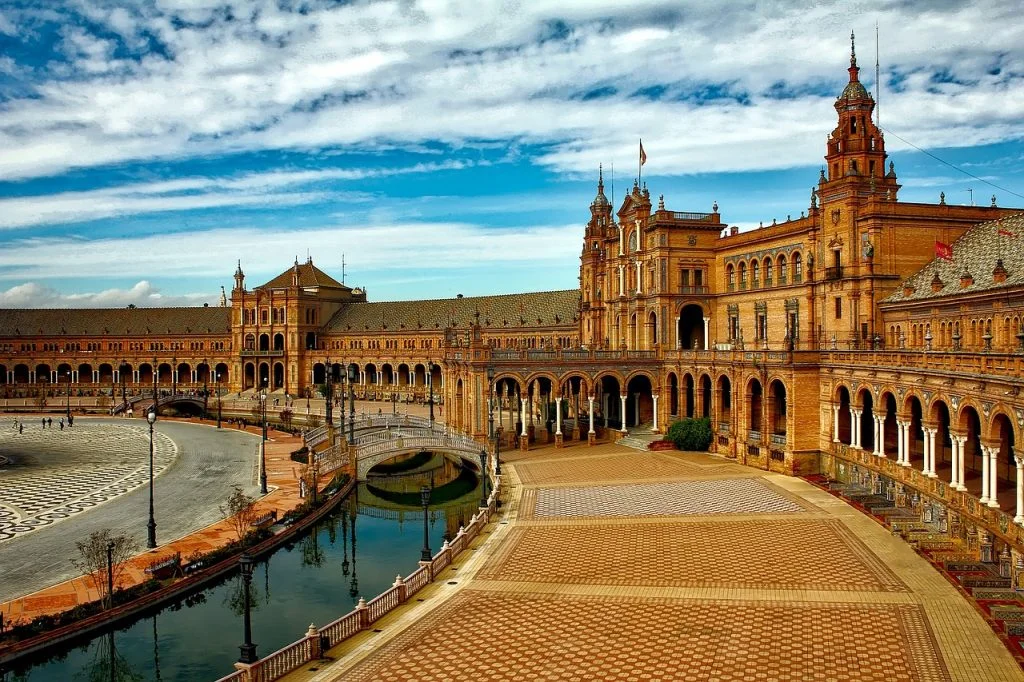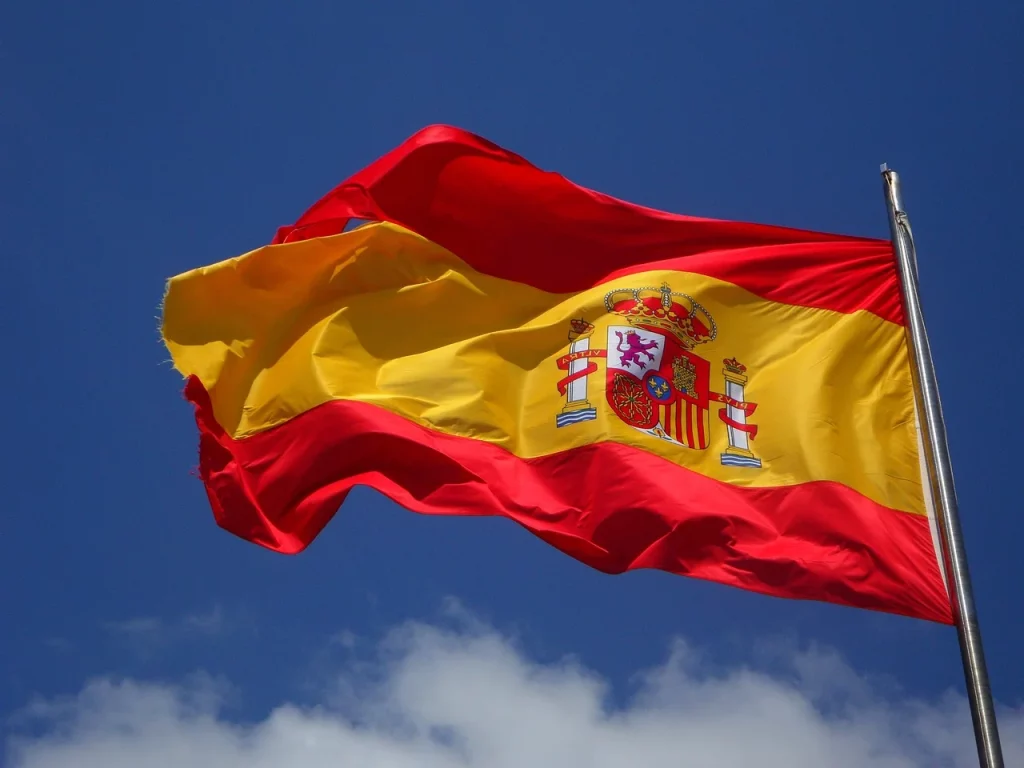Ah, lovely Spain! The land where siestas are a cultural institution and saying ‘no‘ to tapas is considered a culinary crime. This article is your ticket to becoming an honorary Spaniard.
Did you know that Spain produces over half of the world’s olive oil? That’s enough to make salads worldwide slip and slide with joy. And have you heard about the great Spanish face-off, La Tomatina, where tomatoes are the weapon of choice?
But it’s not all food fights and olive oil. Spain also boasts the third-largest number of UNESCO World Heritage Sites. I bet you’re wondering, ‘Could I find my dream castle in Spain?’ Spoiler: You might just!
Spain, the beautiful country of wine and songs.
Johann Wolfgang von Goethe
Spain Facts
Ready to explore the wonders of Spain? From its dynamic culture to its historical marvels, I got it all covered here. Keep an eye out for the quiz at the end – make sure you read every detail to succeed!
- Spain is the second largest country in Western Europe and the European Union.
- The official name of Spain is the Kingdom of Spain.
- Spain’s official language is Spanish, the second most spoken native language in the world.
- The Euro (€) is the official currency of Spain.
- Spain is the only European country to have a physical border with an African country (Morocco).
- Madrid, the capital of Spain, is the third largest city in the European Union.
- Spain has a constitutional monarchy form of government.
- The national anthem of Spain, “Marcha Real,” has no official lyrics.
- La Tomatina is a famous festival in Spain where people throw tomatoes at each other.
- Flamenco is a famous dance and music genre that originated in Spain.
- The Iberian Peninsula, where Spain is located, was once under Roman Empire control.
- Paella, a popular Spanish dish, originated in Valencia.
- Spain has 47 UNESCO World Heritage Sites, one of the highest numbers in the world.

- The Alhambra in Granada is one of Spain’s most significant architectural landmarks.
- Spain is one of the world’s biggest producers of olive oil.
- The Sagrada Familia in Barcelona has been under construction since 1882.
- Spanish is the official language in 20 countries across the world.
- Don Quixote by Miguel de Cervantes, a Spanish author, is one of the most influential works in literature.
- Spain’s highest mountain, Teide, is in the Canary Islands and is an active volcano.
- The Siesta, a traditional rest or nap after the midday meal, is a well-known Spanish custom.
- Barcelona is home to many of Antoni Gaudí’s architectural masterpieces.
- The Running of the Bulls is a famous event held annually in Pamplona.
- Tapas, small dishes or snacks, are a culinary tradition in Spain.
- The Iberian Lynx, native to Spain, is one of the world’s most endangered feline species.
- Spain has the third highest number of World Heritage Cities after Italy and China.
- El Camino de Santiago is a famous pilgrimage route ending in Santiago de Compostela.
- Spain introduced chocolate, chilies, and potatoes to Europe after the discovery of the Americas.
- The Real Madrid and FC Barcelona are two of the world’s most famous football clubs.

- Spain has a significant influence in the world of art, with artists like Picasso and Dalí.
- The Canary Islands are known for their unique prehistoric flora and fauna.
- Spain’s diverse landscapes make it a popular location for film and TV productions.
- La Liga, Spain’s top professional football division, is one of the most popular in the world.
- Spanish festivals are known for their vibrant and colorful celebrations, like Feria de Abril in Seville.
- Spain has the second highest life expectancy in the world.
- Spanish cuisine features a wide variety of seafood, reflecting its geographical diversity.
- The Balearic Islands are a popular tourist destination known for their beaches and nightlife.
- Spain was the world’s second most visited country in 2019.
- Cervantes and Shakespeare died on the same date, April 23, 1616, but not on the same day due to different calendars.

- Gazpacho, a cold tomato-based soup, originated in the southern region of Andalusia.
- Ibiza is famous globally for its lively nightlife and electronic dance music scene.
- Spain’s extensive high-speed rail network is the second longest in the world.
- Windmills in La Mancha region are famous due to their association with “Don Quixote.”
- Spain’s national football team won the FIFA World Cup in 2010.
- The Valencia Fire Festival, Las Fallas, is known for its huge papier-mâché figures.
- Churros, a popular snack in Spain, are often enjoyed with hot chocolate.
- The Guggenheim Museum in Bilbao is an example of modern and innovative architecture.
- Catalonia, a region in northeast Spain, has its own distinct culture and language.
- Spain has a rich history of Jewish, Muslim, and Christian influences, especially in architecture and culture.
- The Seville Fair is an annual event featuring traditional dress, horses, and dancing.
- La Rioja region in Spain is world-renowned for its high-quality wines, especially red wines.
Spain Myths

After reading all these interesting facts about Spain, now it’s time to uncover the truths behind some common myths and stories.
- Spaniards Always Take Siestas
While the siesta is a traditional part of Spanish culture, especially in hotter regions, it’s not as common as many think. Modern lifestyles and work schedules mean that most Spaniards don’t take a midday nap. However, some smaller shops and businesses might close briefly in the afternoon. - Spanish is the Only Language Spoken in Spain
Spain is a linguistically diverse country. Besides Spanish (Castilian), there are other official regional languages, like Catalan in Catalonia, Basque in the Basque Country, and Galician in Galicia. These languages have deep cultural and historical roots. - Flamenco is Popular Throughout Spain
Flamenco is traditionally associated with the Andalusia region in southern Spain. While it’s enjoyed nationwide and has become a symbol of Spanish culture, its popularity and practice vary significantly across different regions of Spain. - Bullfighting is Universally Loved in Spain
Bullfighting is a contentious topic in Spain. While it’s a deep-rooted tradition in some parts, many Spaniards are indifferent or opposed to it. Some regions, like Catalonia, have even banned bullfighting, reflecting the diverse opinions on this cultural practice. - Paella is a Staple Dish Everywhere in Spain
Paella originates from Valencia and is a regional dish rather than a national one. Each region in Spain has its own unique cuisine, and while paella is popular and available throughout Spain, it’s not the everyday meal for most Spaniards.
Spain Quotes

Here are my favorite quotes about Spain. Feel free to share yours in the comments section, and I will add them to the list.
In Spain, the dead are more alive than the dead of any other country in the world.
Federico García Lorca
This quote by the renowned Spanish poet and playwright Federico García Lorca reflects on the deep connection Spaniards have with their history and traditions, especially through festivals like Dia de los Muertos.
Spain is a fascinating mix of people, languages, culture and food, but if there is one thing all Spaniards share, it’s a love of food and drink.
Jose Andres
Jose Andres, a Spanish-American chef, highlights the diverse cultural landscape of Spain and the universal passion for gastronomy that unites its people.
For my part, I travel not to go anywhere, but to go. I travel for travel’s sake. The great affair is to move; to feel the needs and hitches of our life more nearly; to come down off this feather-bed of civilization, and find the globe granite underfoot and strewn with cutting flints.
Robert Louis Stevenson
While not specifically about Spain, this quote by Scottish novelist Robert Louis Stevenson captures the essence of adventure and discovery that many travelers find in exploring Spain’s varied landscapes and rich history.
Everything is exaggerated, overdone in Spain.
George Orwell
British writer George Orwell, who fought in the Spanish Civil War, offers a perspective on the intense and passionate nature of Spanish life and culture.
Barcelona is a very old city where you can feel the weight of history; it is haunted by history. You cannot walk around it without perceiving it.
Carlos Ruiz Zafón
Spanish novelist Carlos Ruiz Zafón beautifully describes the historical depth and haunting presence of the past in the streets of Barcelona.
Spain FAQ

After getting inspired by all the quotes and all these fun facts about Spain, we transition to the FAQ section. Keep in mind that the quiz is just ahead, so stay focused while reading these questions.
- How does Spain celebrate Christmas?
In Spain, Christmas is a vibrant and joyous time, filled with unique traditions. On Christmas Eve, known as ‘Nochebuena‘, families gather for a large meal, often featuring seafood. Children eagerly await the arrival of ‘Papá Noel‘ (Santa Claus) for gifts. The holiday season extends to January 6th, which is ‘Three Kings‘ Day’, celebrating the arrival of the Magi with parades and gift-giving. - Are Spain and Portugal allies?
Spain and Portugal, neighboring countries on the Iberian Peninsula, share a long history with complex relations. Today, they are firm allies, both being members of the European Union and NATO. Their alliance is strengthened by economic and cultural ties, and they collaborate on various regional issues. - What is Spain’s most famous dish?
Paella is arguably Spain’s most iconic dish. Originating from Valencia, this colorful rice dish is cooked in a large pan and typically includes a mix of seafood, meats, and vegetables, seasoned with saffron and other herbs. - What is the significance of the Running of the Bulls in Spain?
The Running of the Bulls, or ‘Encierro‘, is a famous event in Spain, particularly in Pamplona during the San Fermín festival. Participants run in front of a group of bulls let loose on the streets. This tradition is controversial but deeply rooted in Spanish culture, symbolizing bravery and festivity. - What is a famous historical site in Spain?
The Alhambra in Granada is one of Spain’s architectural marvels. This fortress and palace complex, dating back to the Moorish occupation, is renowned for its stunning Islamic art and architecture. The intricate designs and serene gardens make it a must-visit historical site in Spain.
Spain Quiz

Join the Spanish quiz! Fail to answer correctly, and don’t be surprised if your GPS starts giving directions only in Spanish. Vamos a empezar!
Conclusion
Well, we’ve had quite the adventure exploring the nooks and crannies of Spain, haven’t we? From the sun-drenched beaches of the Costa del Sol to the historic streets of Madrid and Barcelona, we’ve seen just how diverse and captivating Spain can be.
But what’s truly amazing about Spain is how it all comes together – the food, the festivals, the art, and the people – to create a place that’s alive with passion and joy. I hope this article has sparked your curiosity and maybe even a bit of wanderlust.
So, here’s a question for you: If you could experience one thing about Spain, whether it’s the food, the music, the art, or something else, what would it be? Why?
6 Sources Used For This Article35 unique and interesting facts about Spain – Discover Spain
Interesting Spanish Facts That Will Blow Your Mind – Spanish Vip
15 Interesting Facts About Spain – Balcells Group
General Information – Madrid Embassy
Spain Trip Quotes And Captions For Instagram – AdoTrip


